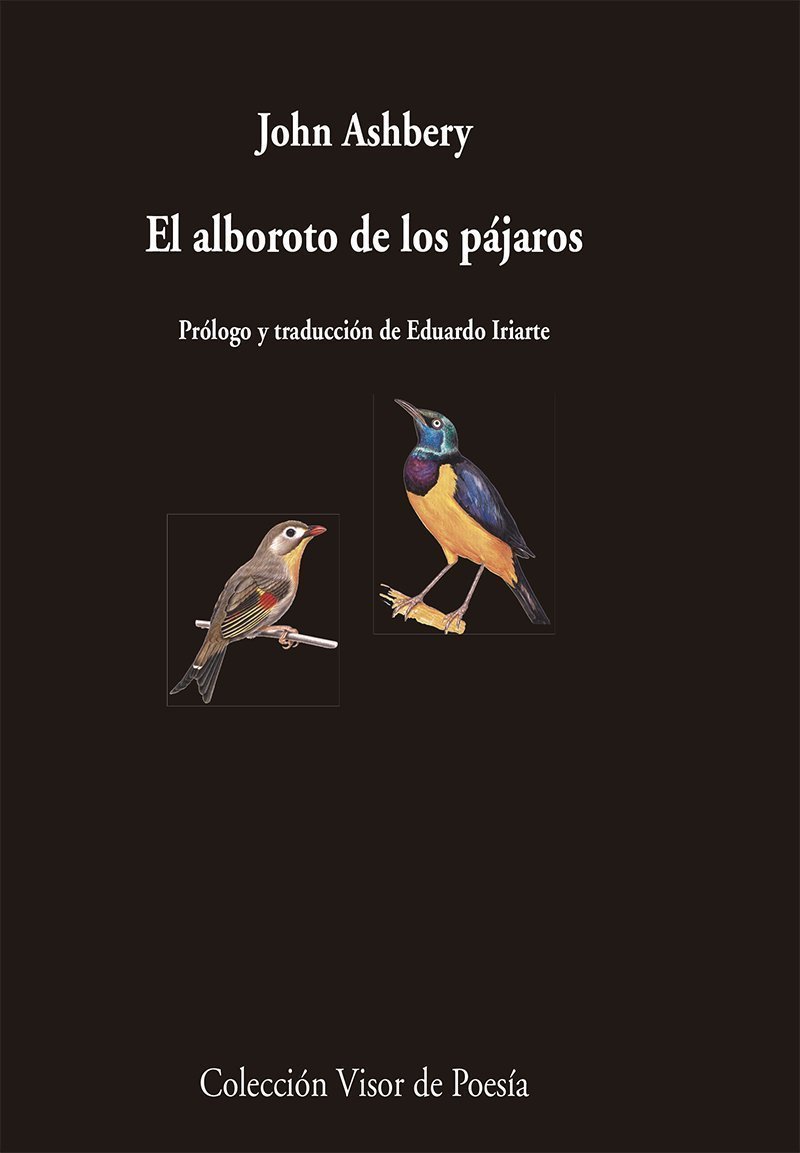El alboroto de los pájaros fue el último de sus títulos que John Ashbery (1927-2017) vio publicado en vida. A sus casi noventa años, después de haber escrito otros veintisiete volúmenes de poesía, una novela, tres obras de teatro y varias antologías de ensayos y traducciones del francés, y de haber recibido todos los premios y honores literarios del mundo anglosajón, desde la Medalla Robert Frost hasta el National Book Critics Award for Poetry, pasando por el Pulitzer, el anciano poeta compuso una elegía involuntaria que sintetiza de algún modo su quimérica aspiración a reflejar en la página, en el poema, la experiencia vital sin filtros, tal como la mente la percibe, la entiende o simplemente la experimenta. Ofrecemos varios de los poemas de este libro que Visor publica en edición bilingüe.
COMMOTION OF THE BIRDS
We’re moving right along through the seventeenth century.
The latter part is fine, much more modern
than the earlier part. Now we have Restoration Comedy.
Webster and Shakespeare and Corneille were fine for their time but not modern enough,
though an improvement over the sixteenth century of Henry VIII, Lassus and Petrus Christus, who,
paradoxically,
seem more modern than their immediate successors, Tyndale, Moroni, and Luca Marenzio among them.
Often it’s a question of seeming rather than being modern.
Seeming is almost as good as being, sometimes,
and occasionally just as good. Whether it can ever be better
is a question best left to philosophers and others of their ilk, who know things
in a way others cannot, even though the things are often almost the same as the things we know. We know, for instance, how Carissimi influenced
Charpentier,
measured propositions with a loop at the end of them that brings things back to the beginning, only a little
higher up. The loop is Italian,
imported to the court of France and first despised, then accepted without any acknowledgment of where it came from, as the French are wont to do.
It may be that some recognize it
in its new guise—that can be put off till another century, when historians
will claim it all happened normally, as a result of history. (The baroque has a way of tumbling out at us
when we thought it had been safely stowed away. The classical ignores it, or doesn’t mind too much. It has other things on its mind, of lesser import,
it turns out.) Still, we are right to grow with it, looking forward impatiently to modernism, when everything will work out for the better, somehow.
Until then it’s better to indulge our tastes in whatever feels right for them: this shoe, that strap, will come to seem useful one day
when modernism’s thoughtful presence is installed
all around, like the remnants of a construction project. It’s good to be modern if you can stand it.
It’s like being left out in the rain, and coming
to understand that you were always this way: modern, wet, abandoned, though with that special intuition that makes you realize you weren’t meant to be somebody else, for whom the makers
of modernism will stand inspection
even as they wither and fade in today’s glare.
EL ALBOROTO DE LOS PÁJAROS
Estamos atravesando el siglo XVII.
La última parte está bien, es mucho más moderna que la primera parte. Ahora tenemos la comedia de la
Restauración.
Webster y Shakespeare y Corneille estaban bien para su época pero no eran lo bastante modernos, aunque suponían un avance respecto del siglo xvi de Enrique VIII, Lassus y Petrus Christus, que,
paradójicamente,
parecen más modernos que sus inmediatos sucesores, Tyndale, Moroni y Luca Marenzio entre ellos.
A menudo es cuestión de parecer más que de ser moderno. Parecer es casi tan bueno como ser, en ocasiones,
y de vez en cuando igual de bueno. Que alguna vez sea mejor
es un asunto que más vale dejar a los filósofos y a otros así, que saben cosas
de un modo que no está al alcance de otros, aunque esas cosas
son a menudo casi las mismas que las que sabemos. Sabemos, por ejemplo, cómo Carissimi influyó en
Charpentier,
propuestas medidas con un giro al final
que remonta las cosas al comienzo, solo que un poco
más arriba. El giro es italiano,
importado a la corte de Francia y al principio denostado, luego aceptado sin reconocer de dónde
procedía, como suelen hacer los franceses.
Quizás algunos lo reconozcan
de esta nueva guisa, que puede dejarse para otro siglo, cuando los historiadores
aseguren que todo ocurrió con normalidad, como resultado de la historia.
(El barroco tiende a salirnos al paso
cuando creíamos que había quedado arrumbado. El clásico lo ignora, o no le importa mucho.
tiene otras cosas en la cabeza, de mayor importancia, al parecer.) Aun así, hacemos bien en crecer con él,
esperando con impaciente ilusión el modernismo, cuando todo se resolverá para mejor, de algún modo.
Hasta entonces más vale complacer nuestros gustos en aquello que les corresponda: este zapato,
ese tirante, llegarán a parecer útiles algún día
cuando la atenta presencia del modernismo esté instalada por doquier, como los restos de un proyecto de obras.
Está bien ser moderno si lo puedes soportar.
Es como quedarse bajo la lluvia, y llegar
a entender que siempre fue esa tu condición: moderno, húmedo, abandonado, aunque con esa intuición especial que te permite comprender que no estabas destinado a ser algún otro, para quien los artífices
del modernismo superen el análisis
mientras se marchitan y desvanecen bajo el fulgor del presente.
PRAYER NOT TO TOUCH
Unwillingly, O queen, I left your shore. Bleeding today, I need you to work with him. It was the summer of long pants and locusts. Few could abide his storming at them, none tried to escape. It was only natural to shrug off
the latest mingled warning, as though it were a commercial for cake mix.
One, foxier than the rest, perceived a rest in the order for that evening.
Chickens were running around, but it was the stricture between heel and toe that captured the gripe water crystallinely. It wasn’t your fault, you see,
that a single potato emerged from the vast how-to library.
The others had long since cashed in their chips and traipsed
homeward. Fear was a small flare on the horizon.
I tell you, it was then I knew you were chasing me, mockery on your lip during the morning meet-and-greet.
Others than I saw the vast
punch pushing love up toward the surface. To do nothing
was our ancient privilege. And though we’d talked about it later,
it always felt unacknowledged, as though we never met, only passed each other in some narrow alley, where
brushing
against one’s neighbor was unavoidable, not putrid.
The four-foot hero sandwich says, “I’m here!” Dozens of golden canaries bask in the receptacle its loose panniers provided. And all right, I said I
wouldn’t do it if I was him. We quarreled and separated as though forever. And a warm feeling
came to replace that other receptacle of pain,
the long-lounging postmark, from the mountains that summer.
UNA PLEGARIA A NO TOCAR
A regañadientes, oh, reina, dejé tus tierras. Sangrante hoy, requiero que te entiendas con él.
Fue el verano de los pantalones largos y las langostas. Pocos soportaban entonces sus acometidas, ninguno intentaba escapar. Era lo más natural ignorar
la última advertencia entremezclada, cual anuncio de masa para tartas.
Alguien, más astuto que el resto, percibió una alteración en el orden de esa velada.
Las gallinas se arremolinaban, pero fue la constricción entre talón y dedo lo que captó el agua para cólicos cristalinamente. No fue culpa tuya, ya ves,
que un solo pazguato emergiera de la inmensa biblioteca de instrucciones.
El resto habían canjeado las fichas hacía rato y se habían ido retirando
a casa. El miedo era un leve llamear en el horizonte.
Te lo aseguro, fue entonces cuando supe que me perseguías,
la burla en tu labio durante las presentaciones matinales.
Otros aparte de mí vieron el vasto
punzón impulsando el amor hacia la superficie. No hacer nada
era nuestro antiguo privilegio. Y aunque hablamos de ello después,
siempre quedó arrinconado, como si nunca nos hubiéramos conocido,
sino apenas cruzado en algún angostó callejón, donde rozarse
con el vecino fuera inevitable, no putrefacto.
El bocadillo del héroe de metro veinte dice: «¡Aquí estoy!».
Docenas de dorados canarios gozan en el receptáculo que brindaban sus holgados miriñaques. Y de acuerdo,
dije
que en su lugar yo no lo haría. Discutimos y nos separamos
como para siempre. Y una cálida sensación vino a sustituir ese otro receptáculo de dolor,
el repantigado matasellos, de las montañas aquel verano.
FEATURETTE
Do not fear the gulches
asleep on the farm. It didn’t die like that.
Don’t go buying anything
and go do something. And very tired, dog-tired, sometimes I think we were better off
before all the new inventions—the trompe-l’oeil fried egg, the American flea. I didn’t die like that.
This is how we usually
yes it is too like that
get it on …
Much of this has little to do
with how we shaved and behaved,
or mixed doubles.
You’re right, the gargantuan sales are over.
I guess my question (a humble bricklayer) is
kiss it and make it go away; the comedy-on-the-train operetta, a huge success when it opened in Shanghai,
sewn right-leg to right-leg. Life is a short short story with explosive simmering.
Who else d’ya like in poetry? We didn’t have time for lunch. Be ready to hug your glass star. I’d advise you to.
Are you scorpion enough to even try? No-good green parents accrue in fives. He doesn’t want to do it himself, then beautiful, and happy
under a coat of vanish, er, varnish. (Not in pharmacies) it went viral.
CORTOMETRAJE
No temas los barrancos
adormecidos en la granja. No murió de esa manera.
No vayas a comprar nada
y vete a hacer algo. Y muy cansado, derrengado, a veces creo que estábamos mejor
antes de todas las nuevas invenciones: el huevo frito de trampantojo
la pulga americana. Yo no morí de esa manera. Así es como por lo general
sí también es así
nos lo montamos…
Mucho de esto tiene poco que ver
con cómo nos afeitábamos y comportábamos,
o mezclábamos dobles.
Tienes razón, las ventas colosales se han acabado.
Supongo que mi cuestión (un humilde albañil) es
darle un beso y curarlo; la opereta de la comedia en el tren, un inmenso éxito cuando se estrenó en Shanghái,
cosida de pierna derecha a pierna derecha.
La vida es un breve relato breve a explosivo fuego lento.
¿Quién más te gusta en poesía? No tuvimos tiempo de almorzar.
Prepárate para abrazar tu estrella de vidrio. Te lo aconsejaría.
¿Eres lo bastante escorpión para intentarlo siquiera? Inútiles padres verdes van de cinco en cinco.
No quiere hacerlo él mismo, entonces hermoso, y feliz
bajo una mano de desvanecido, esto, barnizado. (No en farmacias) se hizo viral.
TALES FROM SHAKESPEARE
It seemed like a huge part of our lives revolved around the woodpile, all buzz
and splatter one minute, low wigwams the next.
He made a horse, like what was on the farm at which end of the store they let
the young men practice. (The others dress funny.) Kids used to hang around, lowering the bar for
the vanilla tower
following its pipsqueak editor out
into the brilliant day, of casings, undeliverable, unprogrammed appliance scepters, more. High bleachers shut off
a section of downtown. It’s a part of France, but I don’t drink at these fountains.
His preceptor writes back and
thick as the dust on these reports (that’s my definition anyway, all enthusiastic,
or do we have to be or does it matter?):
Welcome to the family tree.
I am sick and tired. Startling hog ends up in a commercial
out of the bathroom window. Thanks for the soda, Pop, and digital power. Been wondering what it was.
It was time for the rectory bells, balls, whatever.
It seemed like it to me, too. The reply to her demandingness.
Somebody sends you a bill.
At first you want to laugh. Who said that everything was going to be a thrill?
Just leave it. The little puffin on the green- house steps turned around,
annoyed with everything. OK, let’s cope.
HISTORIAS DE SHAKESPEARE
Parecía que una enorme parte de nuestras vidas giraba en torno al montón de leña, todo rumores y salpicaduras un momento, tipis bajos al siguiente.
Hizo un caballo, como el que había en la granja en cuyo extremo de la tienda dejaban
ensayar a los jóvenes. (Los otros visten raro.)
Los niños solían pasar allí el rato, bajaban el nivel de la torre de vainilla
seguían al fantoche de su editor afuera
hacia el brillante día, de cubiertas, cetros de aparatos, imposibles entregas, sin programar, más. Altas gradas
acordonaron
una zona del centro de la ciudad. Es una parte de Francia, pero yo no bebo de esas fuentes.
Su preceptor responde y
denso como el polvo en estos informes (al menos esa es mi definición, toda entusiasta,
o ¿tenemos que serlo
o acaso importa?):
bienvenido al árbol genealógico.
Estoy más que harto. El cerdo imponente acaba en un anuncio
por la ventana del cuarto de baño. Gracias por el trago, Tío, y la potencia digital. Estaba preguntándome qué era.
Era la hora de las campanas parroquiales, las pavadas, lo que sea.
A mí me lo parecía, además. La respuesta a su exigencia.
Alguien te envía una factura.
Al principio te entran ganas de reír. ¿Quién dijo que todo fuera a ser excitante?
Déjalo sin más. El frailecillo en los peldaños de la casa verde se dio la vuelta,
enfadado con todo. Vale, apechuguemos.
THE UNDERLING
It’s very exciting to walk along, follow these with interesting things,
and get to spend time mostly in Europe in my July pants.
Though we could sign off, the lesbian anchor wants to say something. So how are you?
Our daily stump, guy getting ready to eat one, husbands at a time,
horse removal.
And, arbitrator, he talks about you, pokes around in the refrigeration where all is tickety boo, the larches (all of which are favorable enough),
the darker haired mechanisms, the worker mnemonic—
Hi, Mnemosyne (running episode or lived something like that, entangled lead for the peacekeepers),
because after 200 years the youngster’d want some tomalley.
But, maybe after that…
he could take up cooking— braised sunchokes, coils included.
How did you hear about themselves?
She remembered huh. That’s what it’s for. Adult dolphins, swingeing along…
I’ll put you up on the wall, then make it home for the first time.
And he was probably gonna hurt himself
on the folded glass doors. She must be having another, and we could have a big conversation
or any big sporting group, regular dancers. His lesions were legion.
EL SUBORDINADO
Es muy emocionante pasear,
hacer cosas interesantes después de estas,
y poder pasar tiempo sobre todo en Europa con mis pantalones de julio.
Aunque podríamos despedirnos, el ancla lesbiana quiere decir algo. Bueno, ¿cómo estás?
Nuestro muñón diario, un tipo se dispone a devorar uno, esposos a un tiempo,
supresión de caballos.
Y, mediador, ese habla de ti, hurga en la refrigeración
donde todo va de maravilla, los alerces (todos ellos bastante favorables),
los mecanismos de cabello más oscuro, la mnemotecnia del trabajador:
Hola, Mnemosine (episodio continuado o viví algo parecido,
plomo enmarañado para los que mantienen la paz),
porque después de 200 años los jovenecidos quieren sustancia.
Pero, quizá después de eso…
podría dedicarse a cocinar:
alcachofas cocidas, zarcillos incluidos.
¿Cómo te enteraste de ellos mismos? Ella recordó ¡eh! Para eso sirve.
Delfines adultos, avanzando vertiginosos… Te colgaré en la pared, luego
vuelvo a casa por primera vez.
Y probablemente él iba a hacerse daño
en las puertas plegables de vidrio. Ella debe de estar tomando otra,
y podríamos tener una gran conversación
o algún gran grupo deportivo, bailarines habituales. Sus lesiones fueron legión.
—————————————
Autor: John Ashbery. Título: El alboroto de los pájaros . Editorial: Visor. Venta: Amazon, Fnac y Casa del libro






Zenda es un territorio de libros y amigos, al que te puedes sumar transitando por la web y con tus comentarios aquí o en el foro. Para participar en esta sección de comentarios es preciso estar registrado. Normas: